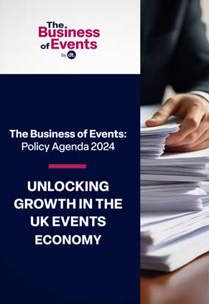
How an independent think tank aims to transform the events industry
AT THE EICC, we’re passionate about hosting events which inspire world changing ideas. Everyday, in our venue, great minds come together at business events spanning all sorts of global industries, from science and medicine to education and technology. Of course, Events in itself, is an important industry. Just like every other sector, in order to innovate and grow, we must share our challenges and ideas with one another. We’re fortunate to have individuals within our industry who recognise this, and make it their business to gather ideas from across the sector and advocate for the changes in policy we need to perform our role as ‘connectors’ to the very best of our abilities.
One such individual is Martin Fullard, Director of News & Content at The Business of Events, an independent think tank and advocacy network which conducts research and promotes engagement within the industry, as advises the All-Party Parliamentary Group for Events. Recently, we managed to pin Martin down for a chat to share more about what he does and why he believes it can change the future of events.

So Martin, can you tell us firstly how The Business of Events began and what it seeks to achieve?
Of course. Essentially, what we do is research policy initiatives we think the government should explore, and hopefully implement, to create a stronger, better events economy.
The key is that we ask the right questions to the right people
We look at similar industries, not just in the UK, but globally, before ‘stress testing’ the concepts with the All-Party Parliamentary Group (APPG) for Events. Any policy initiative has to be realistic, and APPG members feedback on whether or not something needs further research.
Founded in 2011, the All-Party Parliamentary Group for Events (APPG) is a cross-party group made up of members from both Houses of Parliament, and acts as the event industry’s voice in Westminster. It was set up by Davies Tanner in 2011, which is the parent company of The Business of Events, and we are the Secretariat.
In a nutshell, we aim to unlock the true potential of what the sector offers through working with policymakers.
How do you stay up-to-date with what is happening in the events industry and the issues which need to be addressed?
Mostly, by asking a lot of questions – but the key is that we ask the right questions to the right people.
I was a journalist for the events industry for many years, and remain a commentator, so I am aware of the broader issues, but staying up-to-date with what’s happening is about always being involved in the conversations. We speak directly to stakeholders across the sector, both domestically and globally, to understand what impacts them and what potential solutions may exist.

We exist alongside UKEVENTS, which is the ‘umbrella organisation’ for the sector, its members of which are the varios trade bodies who represent the niche elements of the industry. There is alignment across our organisations.
What is the biggest challenge you face to progress?
The absence of a proper Policy Agenda for the events industry has been a problem for years. During the pandemic, ministers and government departments would ask what support was needed and nobody was able to succinctly answer that question, because it was so hard to define exactly who they were talking about when they said ‘the events industry’.
The sector is incredibly fragmented … so any Policy Agenda has to be broad enough to benefit that very fragmented ecosystem.
The reason for that is that the sector is incredibly fragmented. What connects companies who offer equipment hire, for example, to exhibition organisers who are running huge trade shows and selling commercial space to conferences? These are all part of the same family, but they're very different sorts of businesses, so any Policy Agenda has to be broad enough to benefit that very fragmented ecosystem.
We released our Policy Agenda in July, in the build-up to the General Election, and it includes seven-key areas that we believe will propel the UK’s event economy. These include updating of SIC codes, easier visa scheme, an event tax credit scheme, attracting international events, practical support for competitiveness, investment in convention bureaux, and leveraging events for policy objectives.
The challenge will be in promoting these initiatives across the industry, and marrying them to an ever-changing political discourse.
How do you plan to effect change within the events industry in 2024 and beyond?
In short, by ensuring the MPs in our new-look APPG, and in turn, the government, are having the right conversations. In 2023, we did an industry-wide consultation with around a thousand people in key roles across the sector. From the feedback we received, we distilled everything down to what we thought would be the most effective areas to target. These were then shared, firstly with an advisory council, and then the APPG, who were able to identify which points would hold up best under the scrutiny of the government.
Having a new party in power means that the MPs within the APPG are changing, but while we might not yet be able to divulge who they are, we can reveal what they will be discussing. The seven core pillars in our Policy Agenda which will form the scope of work for members of the APPG.
Every initiative we are putting forward is focused on quietly, but determinedly, building and growing the UK events industry. You might not hear us shouting it from the rooftops, but we are always here in the background, working methodically to make a difference.

The Business of Events Key Policy Initiatives:
| Updating SIC codes: Ensuring accurate representation and targeted support for the events industry. | Easier visa schemes: Facilitating international collaboration post-Brexit for both inbound and outbound events. |
| Event tax credit scheme: Attracting new events and supporting existing ones through financial incentives. | Attracting international events: Providing more support to position the UK as a top destination for global events. |
| Practical support for competitiveness: Using events as a catalyst for growth across various sectors. | Investment in Convention Bureaux: Empowering national and regional bureaus to drive economic development. |
| Leveraging events for policy objectives: Utilising business events as platforms to deliver and promote government policies. | Read the Business of Events policy agenda in full on their website |

